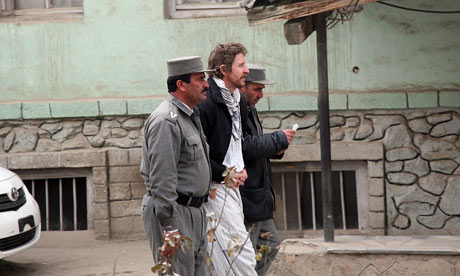-
Wednesday 5 January 2011 19.49 GMT
- Article history

An Australian private security guard who murdered an Afghan worker has escaped the death sentence by paying the family of his victim $100,000 (£65,000), court documents reveal.
The former Australian soldier was handed the death sentence last January after a Kabul court found him guilty of shooting an Afghan colleague before making a crude attempt to make the crime look like a Taliban attack.
But it emerged this week that Robert William Langdon persuaded two supreme court judges that he should be allowed to live after the family of the dead man, who was known as Karimullah, accepted a large compensation payment raised by Langdon's relatives in Australia.
However, the payment, known in sharia law as ibra, was not enough to commute the whole sentence, so Langdon will face 20 years in Kabul's notorious Pol-e-Charki prison, home to Taliban and al-Qaida inmates as well as criminals. The jail term is thought to be the longest given to a westerner in Afghanistan since the toppling of the Taliban regime in 2001.
At the time of the killing in May 2009, Langdon was working for Four Horsemen International, a private firm which works with the US military and specialises in protecting military supply convoys.
According to the Afghan court's two-page judgment on the case, which has been seen by the Guardian, the killing took place during a routine journey with a supply convoy through hostile territory south-east of Kabul.
About 60 expatriate and Afghan guards were travelling with the convoy when they were ambushed by insurgents. After stopping in the capital of Wardak province Karimullah argued with Langdon that it was too dangerous to continue and they should wait until the following morning. During the argument Langdon shot Karimullah as he sat in the cab of his vehicle.
Another foreign contractor was ordered to move the vehicle containing Karimullah's dead body to an isolated area out of town where the guards were ordered to fire their weapons into the air "in order to make it look like an enemy attack".
The vehicle was torched with the help of a grenade thrown by Langdon.
Langdon hurried back to Kabul, where he withdrew $10,000 from his Afghan bank account and tried to board a Dubai-bound plane. However, he was arrested by airport police after some colleagues raised the alarm.
Langdon, who was sentenced to death by two different courts, had argued that he acted in self-defence after thinking Karimullah, who was sitting in a car, was reaching for his own gun.
"He reached across, and I am ex-military, so it was like bang-bang-bang-bang," Langdon said at his appeal. "I didn't have time to think. We had just been hit, we didn't know what was happening and everyone was antsy."
Namatullah Hafizi, head of the attorney general's punishment department, said withdrawing the death sentence was justified given the family's ibra payment, but said that such a ruthless crime deserved a long jail sentence, particularly given Langdon's "cruel" desecration of the corpse.
"Burning the body in our religion is a serious action," he said.
Langdon will serve his sentence in Pol-e-Charki prison alongside just a handful of other foreigners, mainly drug smugglers and murderers.
Langdon's family have not commented on the case and the former soldier himself has shied away from the media since his arrest.
Security firms are widely despised in Afghanistan, where they are blamed for fuelling corruption and behaving with impunity even when their activities lead to innocent members of the public being injured or killed.
The Afghan president, Hamid Karzai, has repeatedly called for security companies to be closed down.
The international community has developed a plan to gradually make such firms redundant over time.

No comments:
Post a Comment